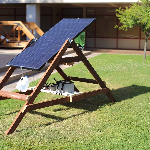Please find below the
Finalist Evaluation
Judges'' ratings
| • | Novelty: | |
| • | Feasibility: | |
| • | Impact: | |
| • | Presentation: |
Judges'' comments
SUBJECT: Your proposal has been selected as a Finalist!
Congratulations! Your proposal in the Energy-Water Nexus contest has been selected to advance to the Finalists round.
Be proud of your accomplishment – more than 350 proposals were submitted and only a very small number have been advanced through these two rounds of judging.
As a Finalist, your proposal is eligible for the contest’s Judges Choice award, as well as the contest’s Popular Choice award, which is determined by public voting.
If you haven’t already, you will soon receive an email from the Climate CoLab staff with details about the voting period. If you don’t receive that email within the next day, or have other questions, please contact the Climate CoLab staff at admin@climatecolab.org
All winners will be announced the week after the voting period ends, on September 12, 2015 at midnight Eastern Time.
Both Judges Choice and Popular Choice will receive a special invitation to attend selected sessions at MIT’s SOLVE conference and present their proposals before key constituents in a workshop the next day, where a $10,000 Grand Prize will be awarded. A few select Climate CoLab winners will join distinguished SOLVE attendees in a highly collaborative problem-solving session. Some contests have additional prizes given by the contest sponsor.
We have attached the final judging comments below.
Thank you for your work on this very important issue. We’re proud of your proposal, and we hope that you are too. Again, congratulations!
2015 Climate CoLab Judges
This proposal is indeed well explained and incorporates most of the judge comments well.The discussion of the risks that come with this product (like theft) was welcomed. The product seems feasible and its construction seems practical. Good use of low tech/high tech combination that could be scalable for both rural and urban environments. Product can be made with local materials.
There is still not enough discussion though on the potential issues with the procurement of the materials needed to build the SunSaluter. How about the maintenance? The maintenance of these devices should be explained thoroughly. This proposal would be stronger if there was a more thought-out discussion about user education, access, and the potential for partnerships with specific organizations/business that may have a stake in this product.possible solutions to the product's risks need to be presented. Also, not enough discussion on policy/political implications is presented.There are too many unknown variables that need to be examined. Operations and maintenance could be an issue with the need for different amounts of water per day to keep the sunsaluter aimed correctly, due to length of day changes throughout the year. There still is a significant investment for the end user for the solar panel that should be considered. This investment faces the familiar challenges of being expensive for the end user or making the end user reliant on outside money (donor countries).
Semi-Finalist Evaluation
Judges'' ratings
| • | Novelty: | |
| • | Feasibility: | |
| • | Impact: | |
| • | Presentation: |
Judges'' comments
SUBJECT: Your proposal has been selected as a Climate CoLab Semi-Finalist!
Proposal: SunSaluter: a low-cost, passive solar tracker that produces clean water
Contest: Energy-Water Nexus
Congratulations! Your proposal submitted to the Energy-Water Nexus contest has been selected to advance to the Semi-Finalists round.
You will be able to revise your proposal and add new collaborators if you wish, from July 1st until July 14, 2015 at 23:59pm Eastern Time.
Judges' feedback are posted under the "Evaluation" tab of your proposal and below. Please incorporate this feedback in your revisions, or your proposal may not be advanced to the Finalists round. We ask you to also summarize the changes that you made in the comment section of the Evaluation tab.
At the revision deadline listed below, your proposal will be locked and considered in final form. The Judges will undergo another round of evaluation to ensure that Semi-Finalist proposals have addressed the feedback given, and select which proposals will continue to the Finalists round. Finalists are eligible for the contest’s Judges Choice award, as well as for public voting to select the contest’s Popular Choice award.
Thank you for your great work and again, congratulations!
2015 Climate CoLab Judges
Clear and concise. Interesting advance in the topic; this seems to be a more efficient technology that the one that we have seen implemented in many parts of the world. Nice proposal, well presented and very thoughtful. This would be a very doable and appropriate technology for underdeveloped areas that would add a significant efficiency to PV. They seem well on the way to success. This is a very interesting idea that is well described and offers a beautifully simple solution. The proposal touches on most if not all the issues.
The effects of increased demand on wood and bamboo should be quantified. The water purification should be explained more clearly. Also, where do the bottles come from? are they plastic? Glass? It is unclear on how water is 'produced'. Also, proposal costs are not included. The proposal would have benefitted also from including an assessment of the difficulties in getting communities to implement some of these technologies. Perhaps more detail on the water side would be beneficial.
Operations and maintenance could be an issue with the need for different amounts of water per day to keep the sunsaluter aimed correctly, due to length of day changes throughout the year. While the SunSaluter can be made with local materials, there still is a significant investment for the end user for the solar panel. This investment faces the familiar challenges of being expensive for the end user or making the end user reliant on outside money (donor countries). Perhaps microfinance or "micro utility" creation would help pool money to improve feasibility in the developing world.
 Jake Schual-berke Jul 13, 2015 07:20 | Proposal creator
Dear judges,
Thank you for your comments and questions! We have updated our proposal entry to address them as best as possible, given the word limit constraints. We have clarified the amount and cost of user-supplied material that is necessary to build the SunSaluter, and have elaborated on how the water purifier is integrated in to the system. It is difficult to quantify proposal costs, but we have shown the cost of each SunSaluter, which can simply be deployed, but we have also discussed our organization's fundraising goals. The cost of individual projects (e.g. providing SunSaluters for 10 rural schools) depends on many particular circumstances. Lastly, we have touched upon the various implementation challenges and our model of using local partner organizations to address them appropriately.
Thank you very much for your time and consideration!
Sincerely,
The SunSaluter Team
|
